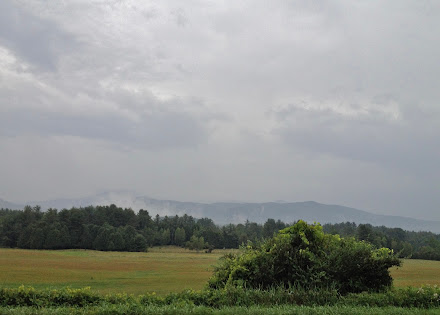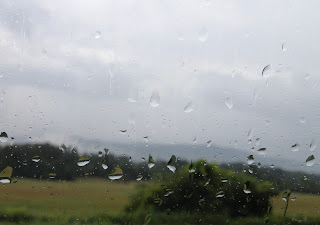July 22.
The hottest night, — the last. It was almost impossible to pursue any work out-of- doors yesterday. There were but few men to be seen out. You were prompted often, if working in the sun, to step into the shade to avoid a sunstroke.
Fogs almost every morning now. Now clouds have begun to hang about all day, which do not promise rain, as it were the morning fogs elevated but little above the earth and floating through the air all day.
P. M. -- To Assabet Bath.
There is a cool wind from the east, which makes it cool walking that way while it is melting hot walking westward.
Gerardia flava, apparently two or three days, Lupine Hillside up railroad, near fence.
Solidago odora, a day or two, Lupine Hillside, and what I will call S. puberula, to-morrow. S. altissima on railroad, a day or two.
H. D. Thoreau, Journal, July 22, 1854
The hottest night, — the last . . . There is a cool wind from the east, which makes it cool walking that way while it is melting hot walking westward. See July 22, 1852 ("A strong west wind, saving us from intolerable heat, accompanied by a blue haze, making the mountains invisible. We have more of the furnace-like heat to-day, after all."); July 22, 1855 (''Dog day weather begins.") See also
A Book of the Seasons, by Henry Thoreau,
Locust, Dogdayish Days
There were but few men to be seen out. See
July 22, 1853 (" I enjoy walking in the fields less at this season than at any other; there are so many men in the fields haying now.")
Fogs almost every morning now. See
July 22, 1851 ("The season of morning fogs has arrived.”); See also July 18, 1852 ("Now the fogs have begun, in midsummer and mid-haying time "); July 19, 1853 ("This morning a fog and cool.")
Lupine Hillside. See
July 12, 1857 ("It is always pleasant to go over the bare brow of Lupine Hill and see the river and meadows thence.")
Gerardia flava, apparently two or three days. See
July 28, 1853 ("The
Gerardia flava in the hickory grove behind Lee's Cliff.");
July 28, 1856 (
Gerardia flava, apparently several days.) [
Gerardia flava now know as
Aureolaria flava (smooth false foxglove)]
Solidago. See July 17, 1853 ("Rank weeds begin to block up low wood-paths, — goldenrods, asters, etc.");
July 18, 1854 ("Methinks the asters and goldenrods begin, like the early ripening leaves, with midsummer heats.");
July 19, 1851 ("Beyond the bridge there is a goldenrod partially blossomed."); July 24, 1856 ("In the low Flint's Pond Path, beyond Britton's, the tall rough goldenrod makes a thicket higher than my head.");
July 28, 1852 ("
Solidago altissima (?) beyond the Corner Bridge, out some days at least . . . Goldenrod and asters have fairly begun.");
August 14, 1856 ("
Solidago odora abundantly out.")
Fogs every morning.
Now clouds hang about all day
but it does not rain.
"A book, each page written in its own season,
out-of-doors, in its own locality."
~edited, assembled and rewritten by zphx © 2009-2024
https://tinyurl.com/hdt-540722
[At dusk we hike to the view without headlamps on, arriving to a spectacular light show of constant lightning flashes and bolts to the northwest — so far away we only occasionally hear the thunder. we water the dogs and linger as long as we dare. Loki watches the light show. my water bottle has dropped somewhere on the trail so we walk back the same route. Little Acorn is on an elastic leach strapped to my waist, her first outing since her surgery 10 day ago. A short hike. It has been a 90 degree day and two fans so loud in the family room we do not hear when the deluge hits home a little later. ~ zphx 20160722]


















